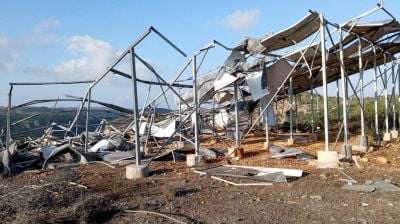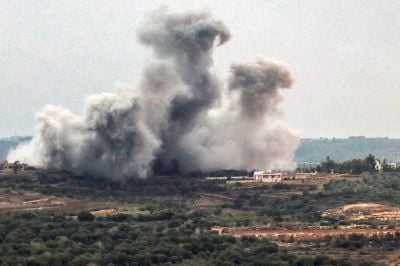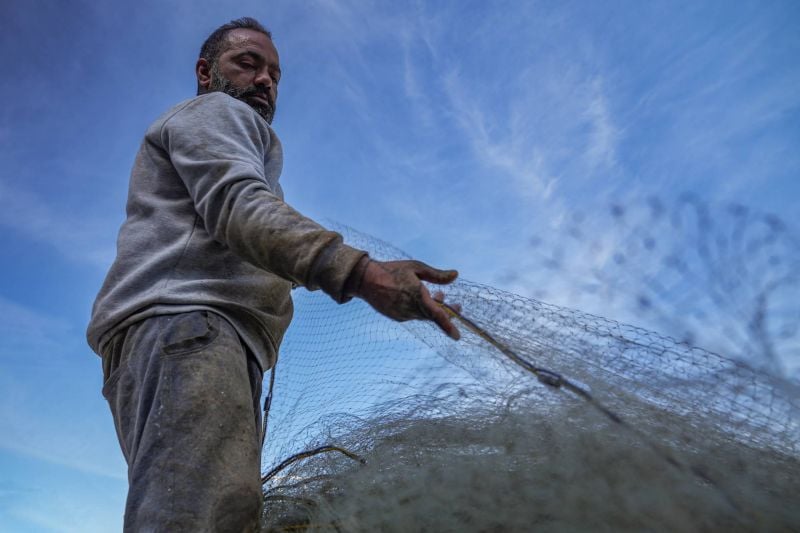
A fisherman puts away his net in Mina Sour, South Lebanon, after an all-night fishing trip, Feb. 8, 2024. (Credit: Mohammad Yassine/L’Orient Today)
SOUR — It was 1981, a year before the Israeli invasion’s tempest swept over Lebanon. Seventeen-year-old Khalil Taha and his father, immersed in the tranquil act of fishing off the shores of Qasmiyeh, eight kilometers north of Sour, suddenly found themselves surrounded by Israeli coast guards.
With ruthless efficiency, the Israeli soldiers seized their boat, stripped them of their clothes and blindfolded them.
“They stole our [fishing] nets and drowned the boat’s motor with water,” Taha grins as he recalls the “absurd” series of events. Cast into a sea of uncertainty, Taha and his father were instructed to hop aboard the Israelis’ boat.
“We weren’t sure what was going to happen to us,” Taha recalls, his voice heavy with dark memories. They eventually arrived in Haifa, along with their towed boat. It would be the start of a two-day ordeal.
Stories like Taha’s abound among the war-weary fishermen of South Lebanon’s Sour and Naqoura.
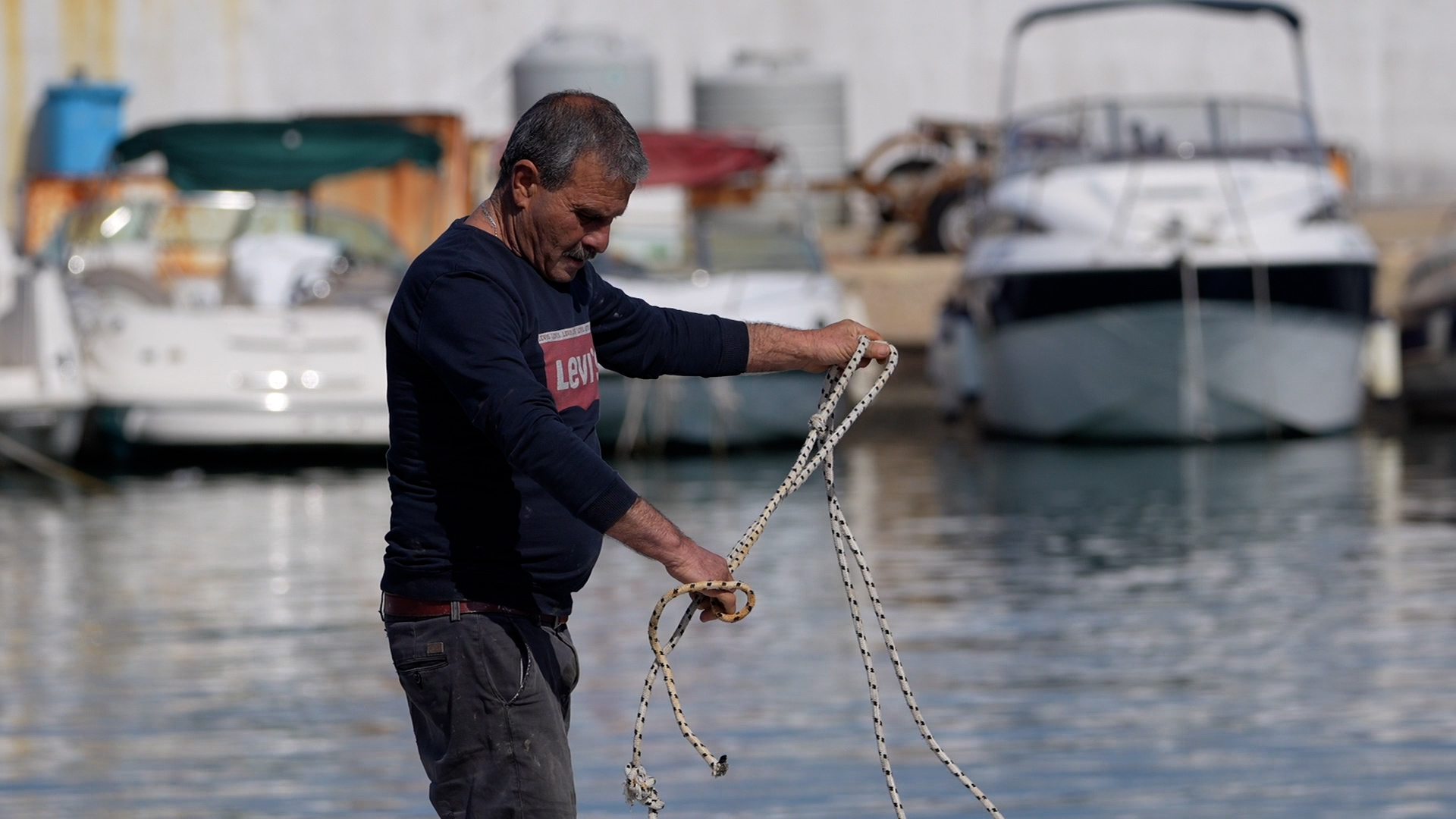 A fisherman puts away a rope in Mina Sour, South Lebanon, after returning from a fishing trip, Feb. 8, 2024. (Credit: Mohammad Yassine/L’Orient Today)
A fisherman puts away a rope in Mina Sour, South Lebanon, after returning from a fishing trip, Feb. 8, 2024. (Credit: Mohammad Yassine/L’Orient Today)
Two fishermen, their faces weathered by salt and sea, pack away their nets in Mina Sour — the city’s marina — one morning in February after an all-night fishing trip.
“There are no fish here, the fish are there,” one of them says, pointing southward down the coast to Naqoura — a sea village 20 kilometers away, just above the border with Israel. But, since the cross-border war began to unfold months ago, the two fishermen haven’t been going further south than Rashidieh and Qulailah, less than half that distance.
“We are scared to travel any further.”
Hezbollah and Israel began exchanging fire on Oct. 8, a day after Hamas' al-Aqsa Flood operation in southern Israel.
Forty civilians, including journalists, have been killed in Lebanon since the beginning of what is now a four-month-long conflict that has also wrought huge destruction in southern Lebanon's villages, farmland and sea.
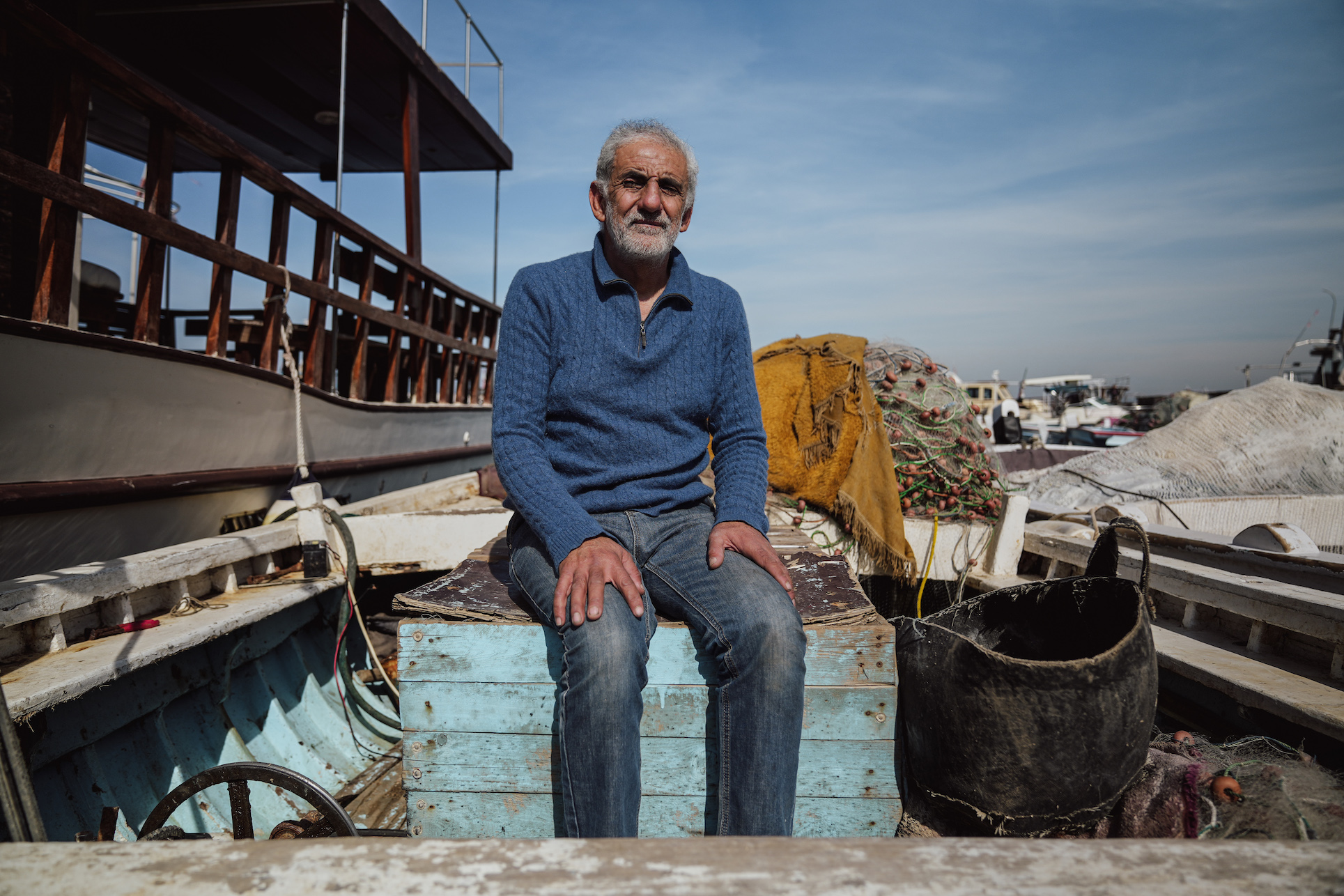 Riad Bawab, a fisherman and the deputy of the fishermen’s cooperative in Naqoura, poses for a portrait in Mina Sour, South Lebanon, Feb. 8, 2024. (Credit: Mohammad Yassine/L’Orient Today)
Riad Bawab, a fisherman and the deputy of the fishermen’s cooperative in Naqoura, poses for a portrait in Mina Sour, South Lebanon, Feb. 8, 2024. (Credit: Mohammad Yassine/L’Orient Today)
Still, local fishermen say they are braving the rough waters, their routines punctuated by the ominous sounds of explosions and the sight of Israeli fighter jets streaking across the sky.
Overnight, a group of fishermen hauled around four to five kilos of fish, says one of them, Nicholas Khoury. “This just covers the price of diesel,” he adds.
“Further south, however, in Naqoura, we would come with the entire boat brimming with fish.”
There the waters remain untainted by pollution and dynamite, the fishermen say. But the promise of a better catch lies frustratingly out of reach due to the threat of Israeli bombings.
That threat, also looming dangerously close to Sour, has deterred tourists, on whom the local fish markets and restaurants heavily depend.
The fish market in Naqoura is now almost deserted, and the one in Sour is footed by fewer customers, says Riad Bawab, a fisherman and the deputy of the fishermen’s cooperative in Naqoura. The losses have pushed operators to decrease fish prices, he tells L’Orient Today.
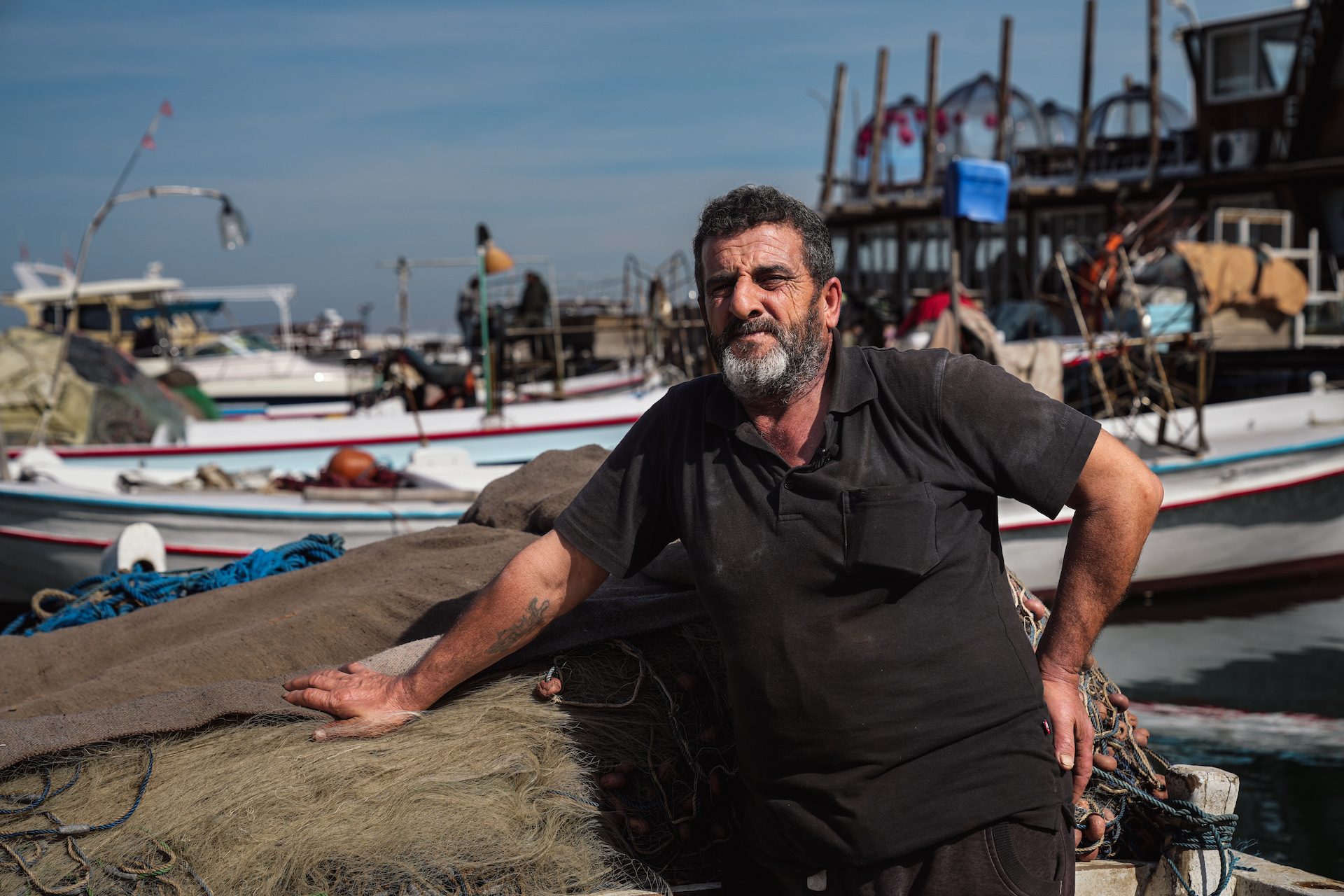 Fisherman Ali Taha poses for a portrait in Mina Sour, South Lebanon, Feb. 8, 2024. (Credit: Mohammad Yassine/L’Orient Today)
Fisherman Ali Taha poses for a portrait in Mina Sour, South Lebanon, Feb. 8, 2024. (Credit: Mohammad Yassine/L’Orient Today)
Israeli soldiers lying in wait
Israeli forces have long harassed the waters — and fishermen — around Sour. As the men reflect on their circumstances amid the current conflict with Israel, they hark back to a dark parallel past.
Over the years, “most of the fishermen in the south were harassed by [the Israelis],” Taha says.
During the 1980s and 90s, “they used to spray us with water hoses, force us to strip and plunge in the water during the cold winters, and fire bullets toward us,” recalls Sami Rizk, a fisherman and deputy of Sour’s fishermen cooperative.
“We have many injuries among the fishermen community here,” he adds. “One got shot in his neck… and he miraculously survived… one time, another man got shot in his shoulder… he was left with a permanent disability.”
“Yeah, that man was with me [on the boat],” interjects fellow fisherman Ali Taha.
“Another man in Sarafand was shot in his foot,” Rizk shares.
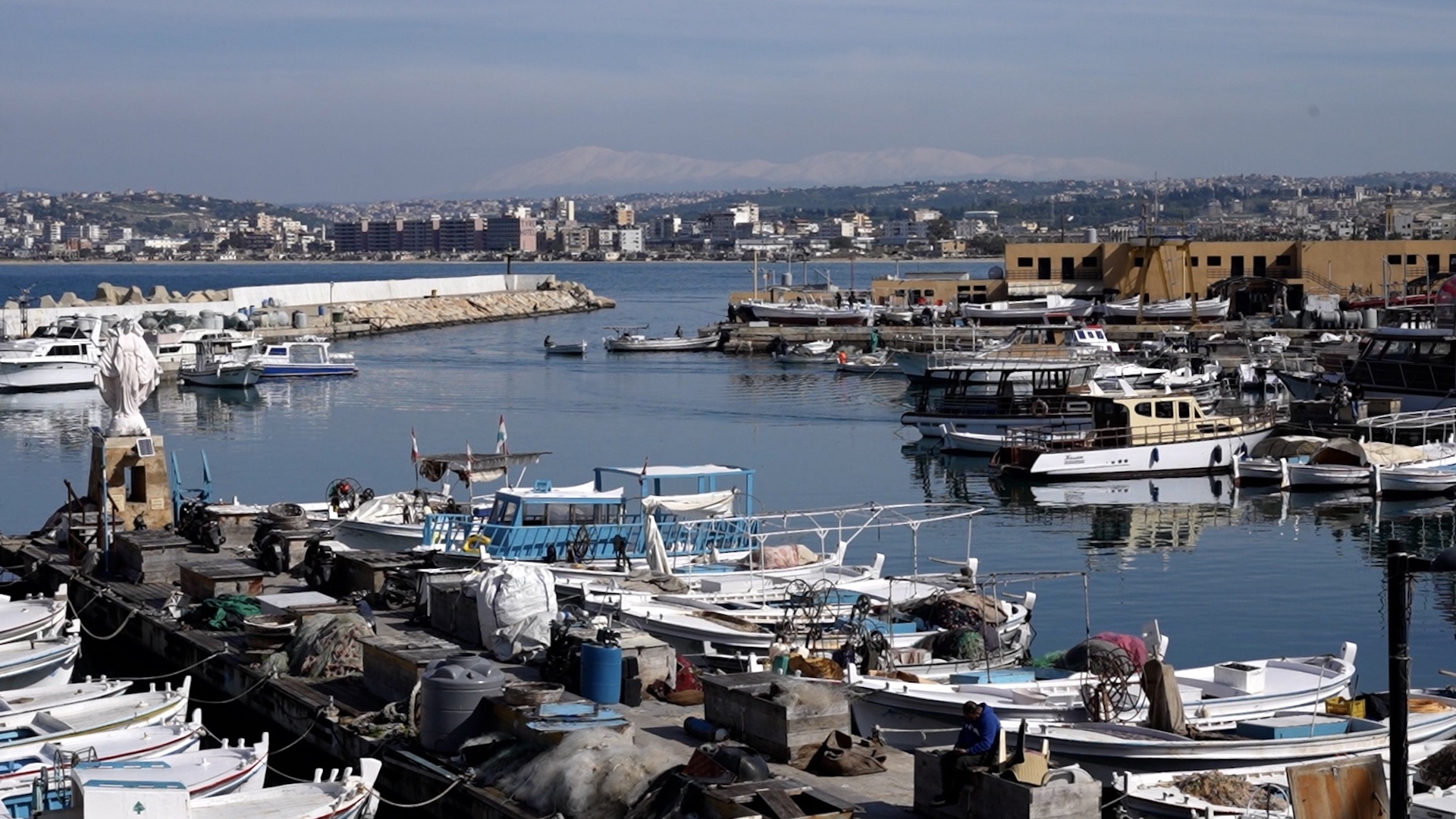 Mina Sour, South Lebanon, Feb. 8, 2024. (Credit: Mohammad Yassine/L’Orient Today)
Mina Sour, South Lebanon, Feb. 8, 2024. (Credit: Mohammad Yassine/L’Orient Today)
“[Israeli soldiers] used to come as close as to Sour or Sarafand, even though we were allowed to fish there,” recalls Rizk, who has been in the business since his teenage years.
“They would steal our nets, and if they don’t want to steal it, they would hang it on their anchors and cruise away till it tears,” the 53-year-old Ali says.
“Sometimes, they would approach our boats, turn on their blinding projectors in our eyes, ask what fish we have, then demand we discard it in the water,” fisherman Taha says.
“Some of [the fishermen] stayed [in Israeli detention] for over a month,” Taha adds. “No one would demand our releases.”
Lebanon was in the midst of a grueling civil war from 1975 until 1990. And from the 1980s until Israel’s withdrawal from southern Lebanon in 2000, Sour was under intermittent Israeli occupation.
“A man, who just passed away last week, was also once taken by the Israelis,” Rizk says. “He had just left Mina [Sour], just a few meters south. He found the Israeli boat waiting for him.”
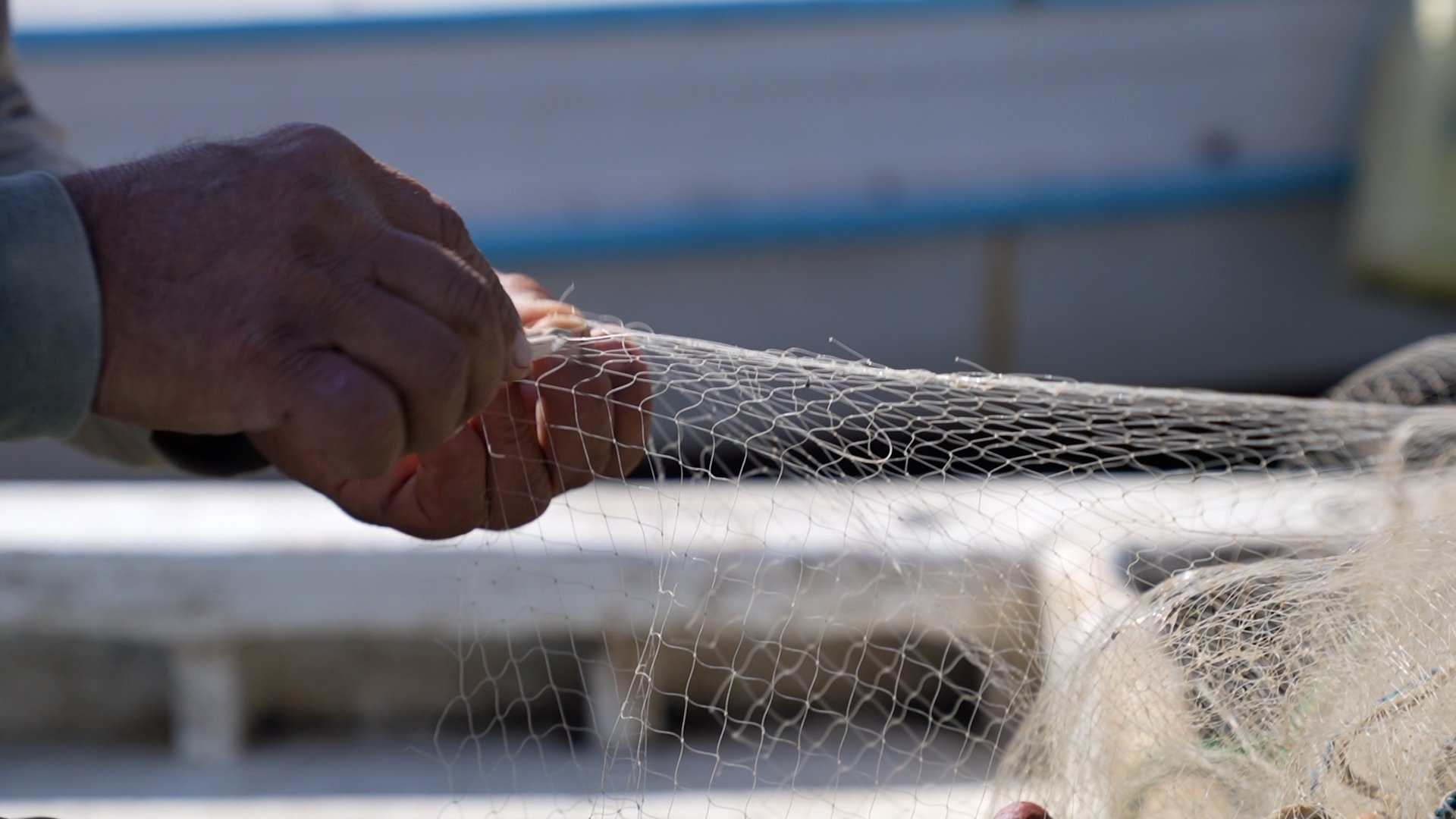 A fisherman working on his fishing net in Mina Sour, South Lebanon, Feb. 8, 2024. (Credit: Mohammad Yassine/L’Orient Today)
A fisherman working on his fishing net in Mina Sour, South Lebanon, Feb. 8, 2024. (Credit: Mohammad Yassine/L’Orient Today)
Israel set up a "line of buoys," which extends six kilometers into the sea from Ras Naqoura, after its withdrawal from southern Lebanon in 2000. According to deputies from southern Lebanon's fishing cooperatives, fishermen are banned from going within 500 meters of the line of buoys, and cannot take their boats farther than 9.6 kilometers west of the Lebanese coast. This severely limited their access to prized catches like tuna and marlin, abundant in deeper waters.
The fishermen in the south are “fishing in an area as big as a lake,” Bawab says.
‘Our soul and livelihood are bound to our net’
Last week, ahead of L’Orient Today’s visit to the southern city, Israeli warplanes flew at low altitude over Sour, carrying out mock raids and dropping an incendiary balloon — which is inflated with a lighter-than-air gas and attached to an explosive — in the nearby countryside.
“It was louder than normal strikes,” says Rizk. “We saw sand disperse above the ground. It was a state of sheer terror in all of Sour.”
Rizk, who mainly uses a speargun to fish, works only at night.
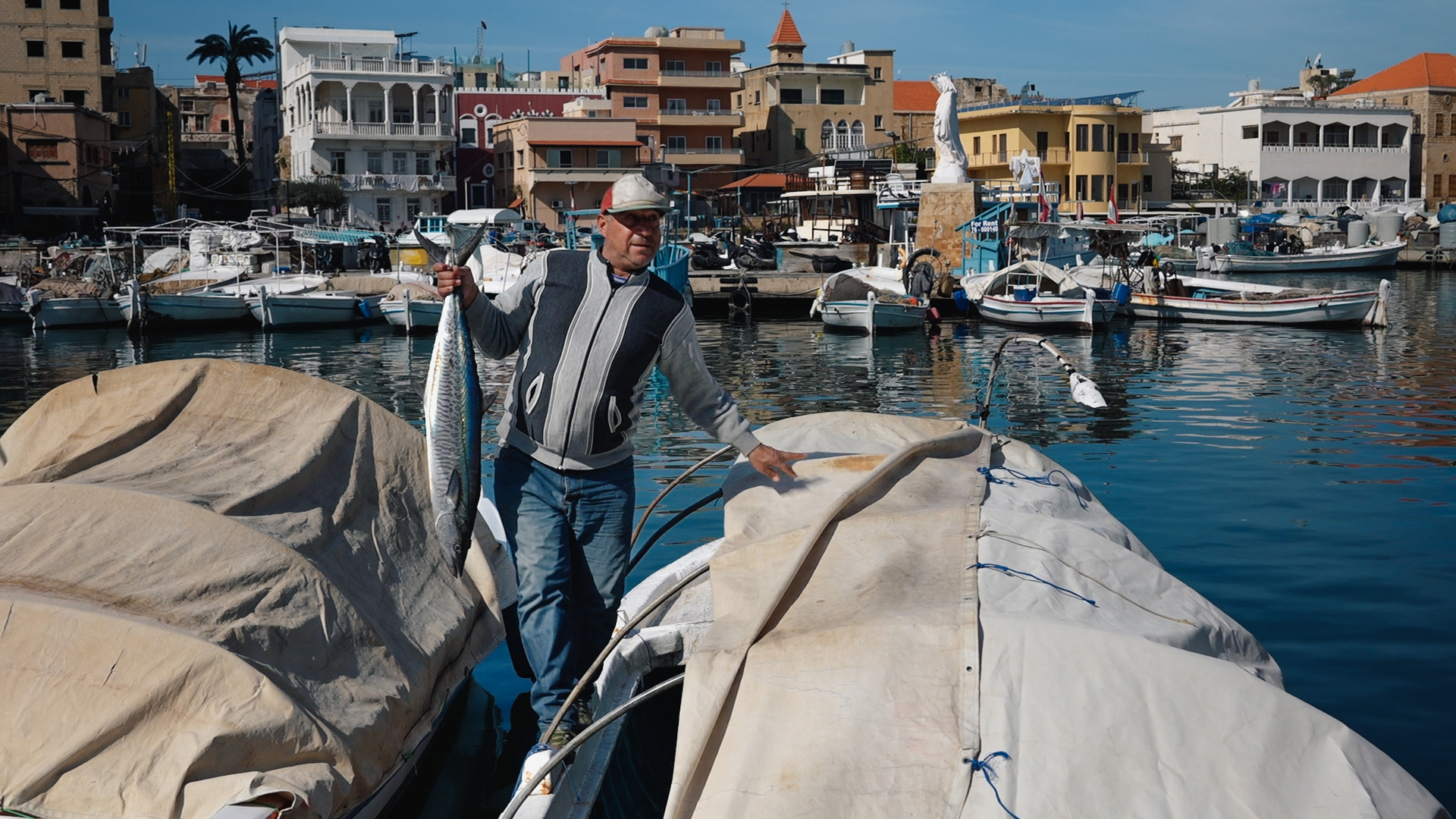 A fisherman carries his morning catch in Mina Sour, South Lebanon, after returning from a fishing trip, Feb. 8, 2024. (Credit: Mohammad Yassine/L’Orient Today)
A fisherman carries his morning catch in Mina Sour, South Lebanon, after returning from a fishing trip, Feb. 8, 2024. (Credit: Mohammad Yassine/L’Orient Today)
“It is crazy when you see it with your eyes how the bombs fall over villages and see the flames, especially at night!” Rizk says. “At night, we see how the rocket gets fired, how it falls over an area and how the shrapnel explodes everywhere.”
“We can hear it louder in the sea,” Rizk says. “We are surrounded by nothing but the water so the sound reaches us easier.”
Bawab says the security instability in the south has shaken the entire fishing industry in the area. Naqoura’s port has been “especially impacted.”
“Many of the fishermen have relocated to Mina Sour, leaving their boats behind,” Bawab says. “Two boats have sunk in Naqoura because their owners were not able to save them amid the bombings.”
He also says night fishing in Naqoura is now completely prohibited, on top of additional distance restrictions, enforced by the Lebanese Army up to al-Biyada, over seven kilometers north of Naqoura's fishing port.
Lost sources of income
Ali Taha comes from a long line of fishermen who have relied on the Mediterranean to make a living.
One day in January, he found himself amid the sounds of loud shelling in the nearby Lebanese countryside close to Naqoura. Though the bombs weren’t hitting the sea, he was worried about going back to shore. He simply “kept moving in the sea,” he recalls.
Ali, who has three children at home to feed, says he had no choice but to continue fishing. Once his net — an essential and expensive tool of his trade — is cast, leaving without it is not an option.
“I need to wait till I get it out,” which is usually a matter of 30 minutes, he says.
“Our soul and our livelihood are bound to that net,” Ali says.
The multi-year economic crisis in Lebanon has compounded their challenges. With one mesh costing between $4,000 to $6,000, the burden of replacing them is heavy, particularly as they are made of imported materials.
Stuck at sea that night near Naqoura with his net already cast, “we needed to at least make back the money we spent on diesel… it is very expensive,” Ali says.
Finally, at daybreak, the shelling stopped. He recovered his fishing net before heading back to the shore.
“We are risking our lives just to feed our children,” Ali says.
Seagulls squawk and waves lap rhythmically against the feluccas, traditional small boats, tied to Sour’s Mina, as the fishermen share sea tales in Rizk’s Mina office.
They trickle into the room, collecting monetary aid, cooking oil and diesel — aid from the fishermen's cooperative that they rely on.
As Taha recounts his harrowing tale of kidnapping at sea, he also collects his aid parcel.
When detained in Haifa, Taha’s now-late father was beaten and questioned. Taha says the Israelis had no reason to detain them.
After languishing in captivity for two nights, the Lebanese Red Cross escorted them back to Lebanon.
But the bleak memory lingers with Taha to this day.
